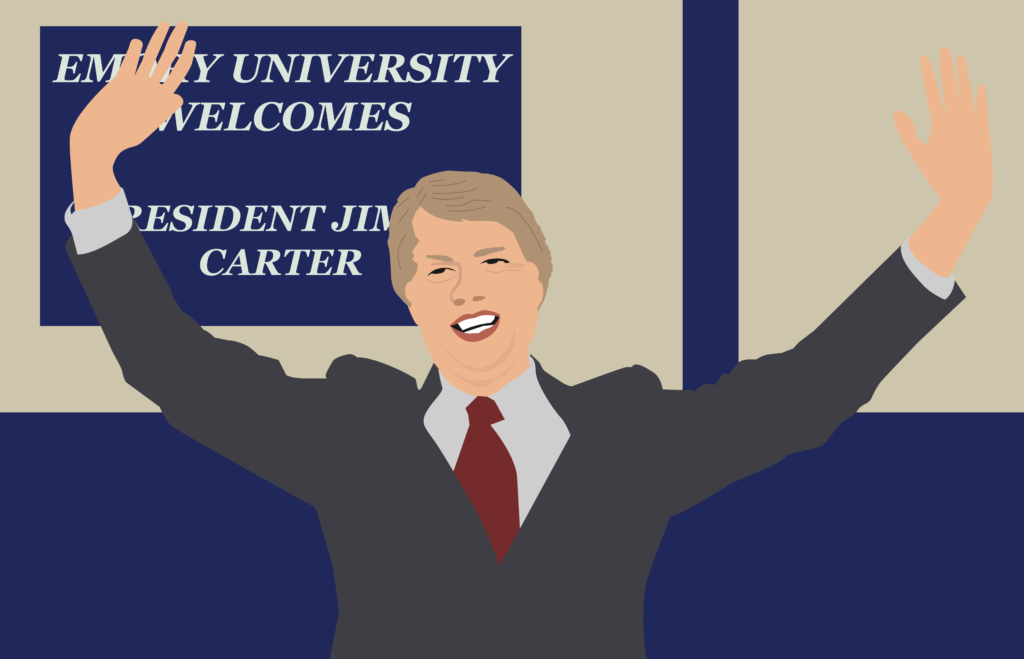
Ben Brodsky/A&E Editor
At 98 years old, Jimmy Carter is the oldest living former U.S. president. He is a man with a strong legacy that rightfully captures the essence of his remarkable lifetime.
But as of March 14, Carter is receiving hospice care at home, likely with the intention of living out his final days comfortably and surrounded by loved ones. As the world reflects on Carter’s impressive life and accomplishments, it is also important to draw our attention to the future, using Carter’s service to the United States and the world as both an example and a standard for how U.S. leaders should assist their country.
Carter, one of only four U.S. presidents to have received the Nobel Peace Prize, has a famously humble beginning. He was raised as a peanut farmer in Plains, Ga. and graduated from the U.S. Naval Academy before returning back to Georgia. As an official member of the Democratic Party, Carter continued advocating for progress both as Georgia’s governor and state senator before he was officially elected president of the United States in 1976.
Carter served as president from 1977 to 1981, with a term marked by several tumultuous events. He established the historic Camp David Accords between Israel and Egypt, created a bilateral peace treaty between Israel and the Palestine Liberation Organization that outlines the path to Palestinian self-governance of the West Bank and Gaza Strip, transferred the control over the Panama Canal back to Panama through domestically controversial treaties and addressed the pressing Iranian Hostage Crisis with an unfortunately disastrous rescue mission. These events were widely seen as failures by the American public because there was no clear resolution to these dilemmas. Coupled with his inability to pass health care and social security legislation, national high interest rates and rising inflation, Carter failed to attain a second term in 1980. Carter’s low approval rating and negative public opinion reflect how mediocre and — as some critics say — abysmal his presidency and central initiatives turned out.
This criticism should be recognized. However, Carter’s dedication to bettering the world is the kind of presidential character that should be lauded. Despite Carter’s highly contentious management of difficult foreign diplomatic negotiations, his steady focus within the United States on human rights, racial equity and energy policy illustrates his steady focus on his values.
Carter’s post-presidential philanthropic efforts are perhaps the most notable parts of his legacy, proving him to be a president who served the nation even beyond his four-year term. In 1982, he established the Carter Center, a non-profit organization dedicated to promoting human rights and resolving conflicts. The Carter Center has been credited for effectively monitoring elections in various countries, working to eradicate hygiene-based diseases like Guinea worm and collaborating with existing organizations to promote greater peace in the Middle East. It is evident that Carter acts not as a politician, directing his good deeds toward a camera, but as a true humanitarian benefiting the world through seeing the faults within it.
In addition to his international efforts, Carter is involved with numerous domestic issues, such as affordable housing through Habitat for Humanity, voting rights and health care reforms. Furthermore, he has been a passionate voice for environmental conservation and renewable energy since his presidency. Carter sets an applaudable example of a president. He used his influence, former title and name value to advocate for human rights globally.
There have been better presidents in U.S. history, but there have also been much worse, particularly in the years since Carter’s presidency. Perhaps more honorable and respectable people like Carter should feel empowered to run for office. Many current representatives and politicians are certainly hollow people — and even worse, spineless leaders. The laundry list of unethical and twisted U.S. leadership spans from Republican standouts such as former President Donald Trump, former President Richard Nixon and U.S. Rep. Marjorie Taylor Greene (R-Ga.) to cross party lines with former President Bill Clinton, and, of course, alone in the uber-corrupt middle with U.S. Rep. George Santos (R-N.Y.). All U.S. presidents have a scandal or two under their belts, including Carter. However, his missteps pale in comparison to Clinton’s perjury in court over his affair with Monica Lewinsky and Nixon’s infamous involvement with the 1972 Watergate scandal.
Trump, despite being an outlying example of corruption and shattered morals, shows how awry politics can go and what elected politicians need to be directly fighting against. After losing the 2020 election, Trump has remained a prominent figure in American politics and media, often spotlighting himself and his achievements rather than addressing the turmoil everyday Americans face, as Carter did. Both during his tenure and after, Trump showed how corruption, discrimination and outright lies can tear apart a country instead of bringing it together, issuing in a new era of disingenuous politicians such as Greene and her Freedom Caucus cohort.
Additionally, Democratic U.S. representatives like Joe Manchin (D-W.Va.) and Nancy Pelosi (D-Calif.) have been known to sideline policies extremely popular with their constituents in favor of the heavy paychecks they receive from corporate benefactors. Recently, Democratic President Joe Biden has even signaled his own priorities after seemingly greenlighting the massive Willow oil project in Alaska, favoring corporations and economic profits over the environmental hazards that will undeniably result.
As opposed to all of these examples, Carter’s tenure and thereafter have uniquely showcased an immense dedication to civility and prosperity that simply is not present in modern politics. With politicians’ impassioned discourses in Congress seeming more like a stunt to gain traction for their new fundraising efforts, Americans now expect public officials to act in their own self-interest rather than for the public good. It is important that our country can find its way to its self-proclaimed values of equality, progress and transparency, following in Carter’s footsteps.
Carter’s entire presidency should not be glorified — no politician’s should. Carter made mistakes during his presidency, and every tiny misstep had dangerous ripple effects. However, we should learn from Carter’s personal values, such as human rights advocacy and humanitarian efforts, and his persistent dedication to peacekeeping and bipartisanship during his term. Having selfless people in politics would, without a doubt, go miles to counteract the bigotry and egoism that runs rampant today. The next U.S. presidential election is in 2024. Yes, Americans should be looking for strong leaders, but also leaders who emulate Carter’s dedication to his country.
When reflecting on Carter’s life, we can find the kind of leadership that the United States should strive for — one that focuses on the continued battles for human rights, rather than the current battles on who can stay in power for the longest.
The above editorial represents the majority opinion of the Wheel’s Editorial Board. The Editorial Board is composed of Isabelle Bellott-McGrath, Evelyn Cho, Ellie Fivas, Marc Goedemans, Aayam Kc, Elyn Lee, Saanvi Nayar, Shruti Nemala, Nushrat Nur and Sara Perez.
The Editorial Board is the official voice of the Emory Wheel and is editorially separate from the Wheel's board of editors.





